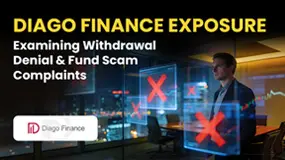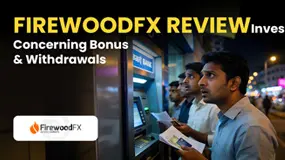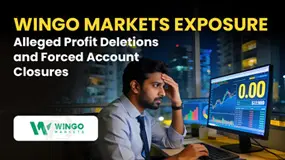Abstract:Young people are the heart of Africa’s emerging online retail FX industry.
However, weak regulations and illiteracy are stumbling blocks.

Exchange of foreign currencies for international trading is not new to Africa. However, broker-powered online retail forex trading has only emerged recently.
From Egypt in North Africa to South Africa, and from Nigeria in Western Africa to Kenya in Eastern Africa, the online forex industry is rising gradually across more than 30 million square kilometres in this continent of 54 countries.
According to estimates, presently, Africa has about 1.3 million forex traders in total, with Nigeria and South Africa, the continents two largest economies, accounting for about 390,000.
The increasing popularity of online forex trading is observable among Africas high youthful populations who now have access to smartphones and enjoy mobile broadband internet.
South Africa, Nigeria, Kenya, Egypt, Tanzania, Namibia and Angola boast the highest numbers of beginner investors who trade forex and contracts for difference (CFDs) alongside cryptocurrencies.
The European Securities & Markets Authority (ESMA) in 2018 rolled out regulations limiting the leverage and restricting the marketing of CFDs in Europe, citing financial risks to the retail investors. Similar restrictions have been imposed by the UKs FCA & the Australian Securities and Investments Commission (ASCIC).
As a result, the growth in Africas nascent online retail forex industry is being led by foreign brokerage firms, mostly from Europe, that are diversifying their portfolios into new markets in Africa as regulations tighten up at home.
Some of the international forex brokers in Africa include Tickmill, Exness, BDSWISS, IC Markets and FP Markets.
Like any other emerging industry, Africas online retail forex markets have its own share of challenges, even as certain trends have defined the industry in the past.
What are these challenges? What are these trends? And what is the way forward? Finance Magnates takes a surgical knife-dive into Africas emerging online retail FX industry.

Southern Africa and the FCSA
South Africa is Africas largest player in the online forex scene. The country's currency, the South African Rand, is the most traded currency in Africa. Rand is also the 18th most traded currency in the world. The country boasts of around 190,000 daily FX traders and over 1000 financial entities.
According to BusinessTech, a top business news site in South Africa, South Africas forex trading volumes including CFDs and spot trading totalled about $2.21 billion per day with a total daily foreign exchange volume of $20.37 billion for all FX instruments in 2019.
The country‘s leading position in the continent has been attributed to the strong regulatory framework provided by the Financial Sector Conduct Authority (FSCA). The FSCA, formed in 2018, is the successor to the country’s Financial Service Board of 2004 which regulated the country‘s forex industry until FSCA’s emergence.
Although FCSAs framework is not yet as strong as those of foreign regulators, it is the oldest and most respected regulator on the continent. Additionally, it regulates some of the foreign brokers in Africa.
As a result, many foreign brokerage firms are seeking to obtain an FCSA license so as to penetrate the African market. It has been said that the interest in South Africa is because the country has no restrictions on the use of leverage in CFDs and FX trading.
However, apart from South Africa, Namibia is another South African country with an increasing number of active online forex retail traders.
Although Namibia has strict rules that allow currency exchange only through authorized dealers, bureaus and commercial enterprises, it has no clear guidelines with regard to online forex trading.
Tradefx.co.za, a South African forex review website, reports that the Namibia Financial Institutions Supervisory Authority (NAMFISA) has made no effort to compel foreign brokers to obtain local supervision. Therefore, forex brokers in Namibia remain largely unregulated.
Western Africa and Nigerias Unregulated Industry
Unlike South Africa, online forex retail trading is unregulated in Nigeria, Africas most populous country. Nonetheless, Nigeria is the second largest retail FX market in Africa.
Although estimates say Nigeria has 10,000 forex traders more than South Africa, Nigeria with about $315m in daily FX trading volume is greatly behind South Africa.
Like the rest of the continent, the Nigerian online retail forex trading is dominated by foreign brokers regulated by commissions such as South Africas FSCA, the Financial Conduct Authority (FCA) in the UK, the Cyprus Security and Exchange Commission (CySEC) and the British Virgin Islands Financial Services Commission (FSA), among others.
In 2018, the Nigerian Securities and Exchange Commission (SEC) warned citizens of the country against engaging in leveraged online retail forex trading solicited by so-called investors.
“Until a framework for regulation of online retail forex trading is developed by the SEC, any person participating or engaged in such investment activity does so at his or her own risk,” the SEC Nigeria said in a statement.
However, a worrisome trend in the Nigerian online forex trading industry is the increasing rate of so-called ‘forex scams’ being perpetrated by supposed chief executives fleecing unsuspecting investors of billions of naira.
In Ghana, online forex trading is common. There are even trading schools such as the Oak Forex Academy that teach people how to trade, from beginner to advanced classes.
Although trading is not as widespread in Côte d'Ivoire as it is in Nigeria, traders in the country also have access to multiple foreign brokers. Some of the top-rated brokers in the Ivory Coast are eToro, Exness, FP Markets and IC Markets.











